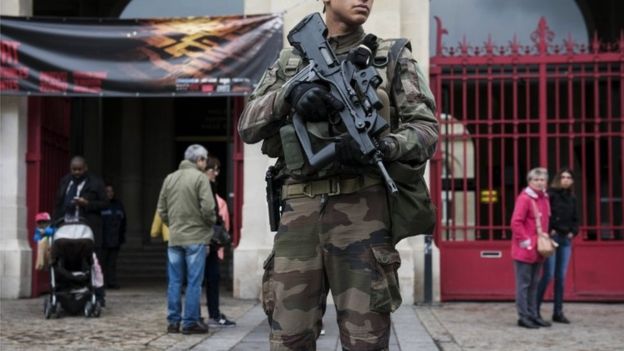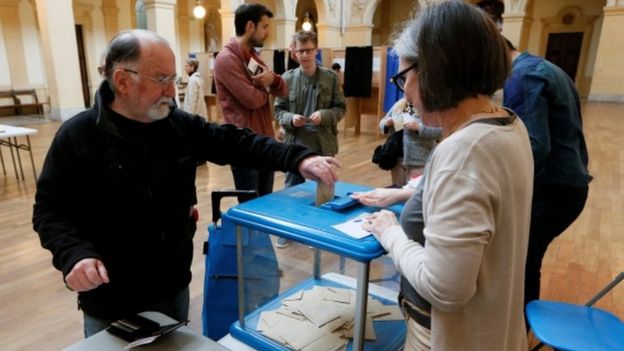French voters are choosing their next president after an unpredictable campaign that has divided the country.
The second round contest pits centrist Emmanuel Macron, a 39-year-old former investment banker, against the far-right nationalist Marine Le Pen, 48.
Voter turnout was 28.2% by 12:00 local time (10:00 GMT), lower than that of previous presidential elections.
The vote is being closely watched across Europe, as the results could affect the future of the EU.
The polls opened in metropolitan France at 08:00 local time (06:00 GMT) on Sunday and close at 19:00 (17:00 GMT).
Polling stations will remain open in some big cities until 20:00 local time (18:00 GMT), with early estimates of the result due to be reported immediately after they close.
Over 50,000 police officers have been deployed to maintain security.
Both candidates have been in the north of France on Sunday, with Mr Macron voting near his home in the sea-side resort of Le Touquet, and Ms Le Pen in the working-class town of Henin-Beaumont, a National Front stronghold.
Both are due back in Paris later in the day.
What is the choice facing voters?
This election marks a new phase in French politics with for the first time neither of the main parties – the socialists and the republicans – having a candidate in the run-off.
The two candidates have offered voters starkly different visions of France.
Mr Macron, a liberal centrist, is pro-business and a strong supporter of the European Union (EU), while Ms Le Pen campaigned on a France-first, anti-immigration programme.
She wants France to abandon the euro in the domestic economy, and hold a referendum on France’s EU membership.
Polls suggest Mr Macron will win the vote, but analysts have said high abstention rates could damage his chances.
By noon, the turnout was lower than that of the 2012 elections (30.7%) and the 2007 elections (34.11%) at the same point.
Read more:
- Where Le Pen and Macron stand on key issues
- Why is France’s presidential election so important?
- Does Le Pen have a chance of winning?
- How do the candidates differ on world affairs?
Why is the vote important?
France is set to elect either its first female leader, or its youngest-ever president.
The poll is also unprecedented because neither candidate is from a mainstream political party.
During the first-round of voting, French voters rejected the two big political parties – the Socialists and the Republicans – that have governed for decades.
The run-off will also be keenly watched across Europe, because it comes ahead of elections in Germany and the UK, and as Britain negotiates its exit from the EU.
What’s this about a hacking attack?
On Friday evening, soon before campaigning officially ended, Mr Macron’s En Marche! political movement said it had been the victim of a “massive” hack, with a trove of documents released online.
The Macron team said real documents were mixed up with fake ones, and electoral authorities warned media and the public that spreading details of the attack would breach strict election rules and could bring criminal charges
What’s this about a hacking attack?
On Friday evening, soon before campaigning officially ended, Mr Macron’s En Marche! political movement said it had been the victim of a “massive” hack, with a trove of documents released online.
The Macron team said real documents were mixed up with fake ones, and electoral authorities warned media and the public that spreading details of the attack would breach strict election rules and could bring criminal charges.
This election marks a new phase in French politics with for the first time neither of the main parties – the socialists and the republicans – having a candidate in the run-off.
The two candidates have offered voters starkly different visions of France.
Mr Macron, a liberal centrist, is pro-business and a strong supporter of the European Union (EU), while Ms Le Pen campaigned on a France-first, anti-immigration programme.
She wants France to abandon the euro in the domestic economy, and hold a referendum on France’s EU membership.
Polls suggest Mr Macron will win the vote, but analysts have said high abstention rates could damage his chances.
By noon, the turnout was lower than that of the 2012 elections (30.7%) and the 2007 elections (34.11%) at the same point.
BBC
 Q FM Africa's Modern Radio
Q FM Africa's Modern Radio


